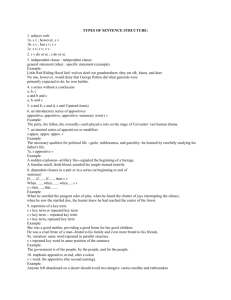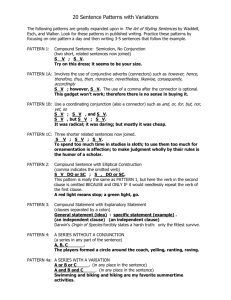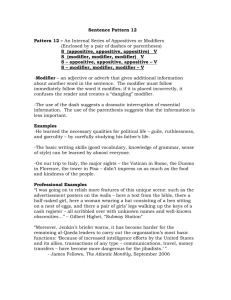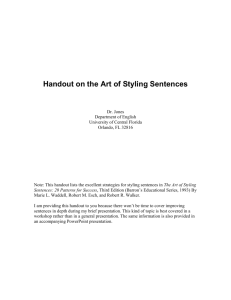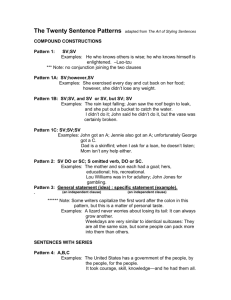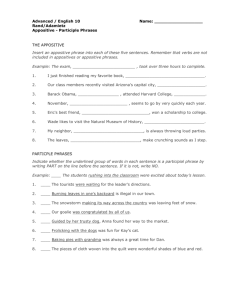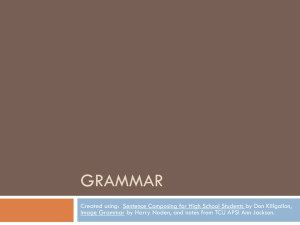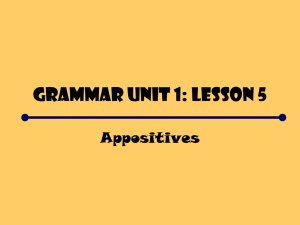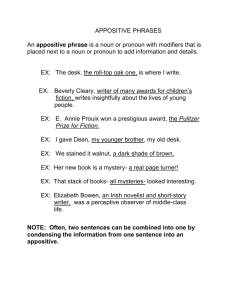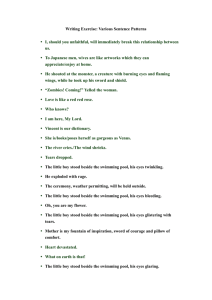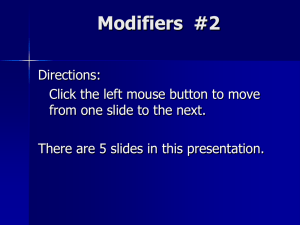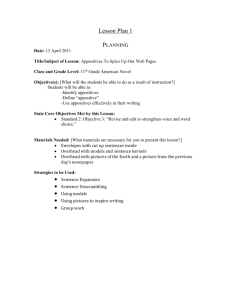Sentence Patterns
advertisement
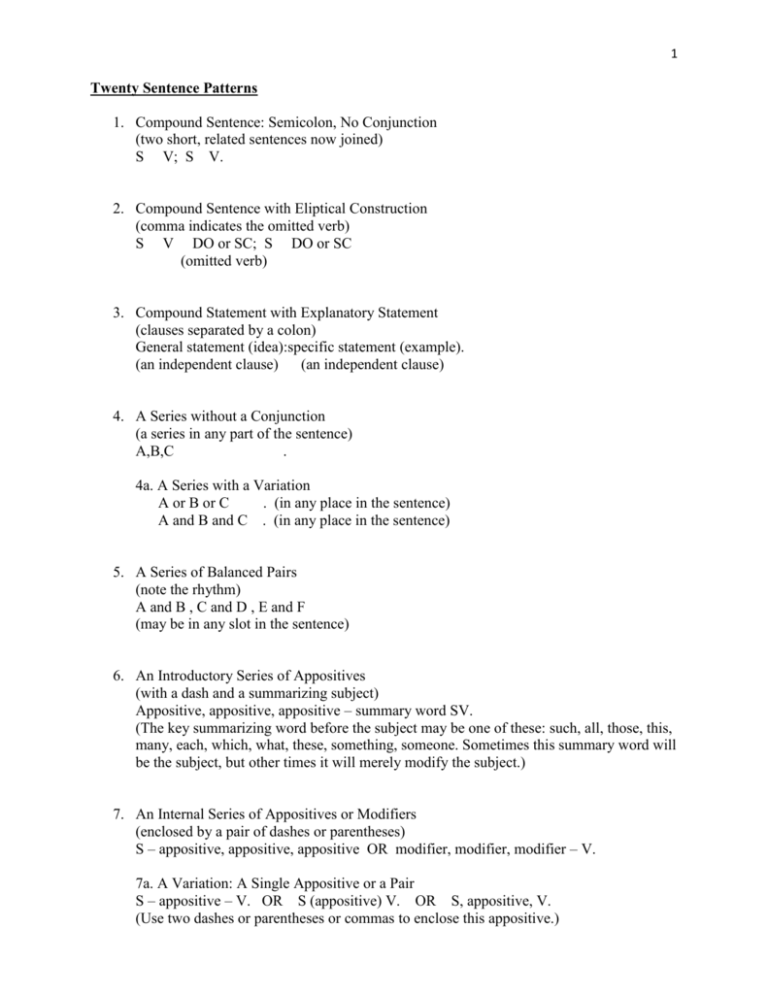
1 Twenty Sentence Patterns 1. Compound Sentence: Semicolon, No Conjunction (two short, related sentences now joined) S V; S V. 2. Compound Sentence with Eliptical Construction (comma indicates the omitted verb) S V DO or SC; S DO or SC (omitted verb) 3. Compound Statement with Explanatory Statement (clauses separated by a colon) General statement (idea):specific statement (example). (an independent clause) (an independent clause) 4. A Series without a Conjunction (a series in any part of the sentence) A,B,C . 4a. A Series with a Variation A or B or C . (in any place in the sentence) A and B and C . (in any place in the sentence) 5. A Series of Balanced Pairs (note the rhythm) A and B , C and D , E and F (may be in any slot in the sentence) 6. An Introductory Series of Appositives (with a dash and a summarizing subject) Appositive, appositive, appositive – summary word SV. (The key summarizing word before the subject may be one of these: such, all, those, this, many, each, which, what, these, something, someone. Sometimes this summary word will be the subject, but other times it will merely modify the subject.) 7. An Internal Series of Appositives or Modifiers (enclosed by a pair of dashes or parentheses) S – appositive, appositive, appositive OR modifier, modifier, modifier – V. 7a. A Variation: A Single Appositive or a Pair S – appositive – V. OR S (appositive) V. OR S, appositive, V. (Use two dashes or parentheses or commas to enclose this appositive.) 2 8. Dependent Clauses in a Pair or in a Series (at beginning or end of sentence) If…, if…, if…, then S V. When…, when…, when…, S V. S V that…, that…, that… . (omit the third clause and have just two, if you wish) 9. Repetition of a Key Term S V key term – repeated key term. OR (use dash or comma before repetition) S V key term, repeated key term. 10. Emphatic Appositive at End, after a Colon S V word: the appositive (the second naming). (with or without modifiers) 10a. A Variation: Appositive (single or pair or series) after a Dash S V word – the appositive (echoed idea or second naming) 11. Interrupting Modifier between S and V S, modifier, V. S – modifier – V. S (modifier that whispers) V. 11a. A Full Sentence (statement or question or exclamation) As Interrupting Modifier S – a full sentence – V. OR S (a full sentence) V. 12. Introductory or Concluding Participles Participial Phrase , S V. S V, Participial Phrase. 13. A Single Modifier Out of Place for Emphasis Modifier, S V. (modifier may be in other positions) 14. Prepositional Phrase before S – V Prepositional Phrase S V (or V S). 3 15. Object or Complement before S – V Object or Subject Complement S V. 15a. Complete Inversion of Normal Pattern Object OR Complement OR Modifier V S. 16. Paired Constructions Not only S V, but also S V. (The also my be omitted) Just as S V, so too S V. (may be so also or simply so) If not , at least . The more S V, the more S V. (may be the less) The former S V, the latter S V. 16a. A “this, not that” or “not this but that” construction In some place other than the verb position 17. Dependent Clause (in a “sentence slot”) as Subject OR Object OR Complement S [dependent clause as subject] V. S V [dependent clause as object or complement]. [How he could fail] is a mystery to me. He became [what he had long aspired to be.] 18. Absolute Construction (noun plus participle] Anywhere in Sentence Absolute construction, S V. S, absolute construction, V. OR S – absolute construction – V. OR S (absolute construction) V. All things considered, the situation seems favorable. What the don reflects is his master’s true emotion, admitted or not. 19. The Short, Simple Sentence for Relief or Dramatic Effect S V. Well, I wonder. It was magical. I think not. Let’s talk. 19a. A Short Question for Dramatic Effect (Interrogative word) auxiliary verb S V ? (Interrogative word standing alone) ? (Question based solely on intonation) ? Auxiliary verb S V ? Then why did he? 4 When will it end? That’s her mother? You made an A in Esch’s class? 20. The Deliberate Fragment Merely a part of a sentence “A final anecdote.” – Frederic Vitoux, European Travel and Life, December/January 1991
